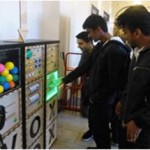London School of Economics – Student Digital Ambassadors for Digital Literacy (SADL)
The 7th CAN case study has been submitted by Dr Jane Secker, Copyright and Digital Literacy Advisor and is available here.
Student Ambassadors for Digital Literacy (SADL) is a programme coordinated by Learning Technology and Innovation and open to LSE undergraduate students. It has been running since 2013, when it started as a pilot in two academic departments. LSE Students Union offer support and promote SADL which aims to develop students digital literacies, but provides an opportunity to understand more about what their needs might be. SADL has operated as a staff student partnership from the outset. It runs as a year long programme for up to 50 students to develop students capabilities around finding and evaluating information, using digital tools for academic practices, managing and sharing information and reflecting on their digital identity.
Birmingham City University: Student Academic Partners
The sixth CAN case study is available in Word or PDF format.
Launched in December 2008, the student academic partners scheme (SAP) brings together project teams of students and staff working in partnership on initiatives designed to improve the student experience. This case study outlines how the SAP scheme was developed and how it has impacted on student engagement and the student experience.
The case study includes examples of the SAP scheme in action and includes details of other student engagement initiatives that have grown from the success of SAP showing how the principle of student engagement and working with students has become embedded in all aspects of the university.
University of Winchester: The Student Fellowship Scheme
 The fifth CAN case study is available in Word or PDF format.
The fifth CAN case study is available in Word or PDF format.
The Student Fellowship Scheme (SFS) at The University of Winchester recruits and trains students to work on targeted educational development projects alongside academics and professional staff. The SFS evolved from the Jisc-funded FASTECH project, a collaborative project involving staff and students at The University of Winchester and Bath Spa University that advanced understanding of assessment-for-learning with technology at both universities and showed the potential for engaging students as active partners in educational development projects. It is now run as a partnership between the university and the Winchester Student Union and there are currently approximately 60 Student Fellows working on a diverse range of research projects. This case study looks at how the scheme has been scaled up since FASTECH and how the principles of student engagement have become embedded across the wider university community.
 University of Lincoln: a research-engaged and collaborative community
University of Lincoln: a research-engaged and collaborative community
The fourth CAN case study is available in Word format or PDF format.
This case study looks at the variety of ways students are engaged across the University of Lincoln as producers of their own education. Building on their successes with the HEA funded ‘Student as producer’ work, the university has extended the partnership approach to the point where students and staff are working collaboratively in a range of roles and initiatives including student engagement champions, students participating in recruitment, student consultants, funded projects and the innovative Insight scheme, a peer mentoring scheme in which every member of the university’s executive team is paired with a student.
University College London (UCL) – UCL digifest: a celebration of staff and student innovation
The first CAN case study is available in Word or PDF format.
UCL’s digifest was a five day festival of all things digital designed to share and grow innovation across the university. Students and staff collaborated as equal partners to bring the vision for UCL digifest to life. This case study looks at the developmental journey behind UCL digifest, the partnership model, lessons learned and how the work is being taken forward.
Steve Rowett and Janina Dewitz from UCL also talk about their experiences of digifest in a recording of a CAN webinar which is available on the Webinar page of this blog.
London Metropolitan University gets Clued up!
The second CAN case study is available in Word or PDF format.
Clued Up! is a combination of an online resource, free workshops and support from a team of Digital Ambassadors all designed to support students both at London Met and in the wider Higher Education (HE) community to develop digital literacy skills. This case study explores the work involved in getting the programme up and running and reflects on how this could be further developed and embedded in curriculum activities in the future.
Jim Pettiward and Helen Long’a Tongu also talk about their experience of Clued Up! and being a Digital Ambassador in a recording of a CAN webinar which is available on the Webinar page of this blog.
The University of Nottingham: How students are making a difference – Students as Change Agents scheme
The third case study is available in PDF format.
The Students as Change Agents scheme was introduced during the 2014-5 academic year to increase levels of student engagement and empower students to make a difference to teaching and learning by working with schools on development projects, which are sponsored by an academic staff member in the appropriate school. Indicative projects could involve research, implementing changes recommended by research, and co-designing assessment methods, modules and learning materials.
Carina Neil, Student Engagement Co-ordinator, at the University of Nottingham, contributed to this case study and can be contacted for further information: carina.neil@nottingham.ac.uk
You can contribute a case study as well
We welcome examples from small scale pilots to faculty or department wide initiatives. Please use the form on the Contact Us page or email Sarah Knight (sarah.knight@jisc.ac.uk) if you would like to share your practice with us.
Additional case studies of interest:
Case studies from our Jisc Digital Student project on how students are working with staff to develop the student digital experience:
- Transforming the student voice process – Pembrokeshire College is using a digital tool and methodology called VocalEyes to support democratic decision-making and improve learner involvement and satisfaction.
- DigiDesk a helpdesk run by students for students and staff – DigiDesk helpdesk service at Barnet and Southgate College helps meet FELTAG recommendations for greater participation in digital leadership activities and schemes.
- Creating a culture shift at Blackburn College – Three projects at Blackburn College are helping students and staff to engage with digital technologies and enhance learning and teaching and the broader student digital experience.
- Building a powerful partnership empowering the student community – two initiatives at Leeds City College to enhance the student digital experience and develop leadership skills, competencies and experience that will prepare student for future study and employment.
Prepare and support students to study successfully with digital technologies: Helen Beetham
Following a call in November 2014, we have identified almost 50 exemplars of effective practice in support of students’ digital experiences. The exemplars have been written up with the support of the staff (and in some cases students) involved. They can be accessed via the seven challenges for institutions, or you can browse the whole set by which are listed on the Jisc Digital Student Blog as exemplars: https://digitalstudent.jiscinvolve.org/wp/exemplars/

